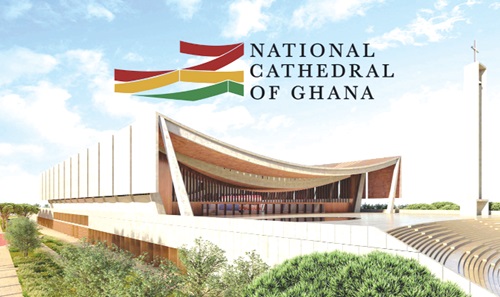
The National Cathedral: A tale of corruption and wrongdoing?
Ghana’s putative national cathedral is once again the centre of attention – and not in a good way.
The project is a focus of President Mahama’s Operation Recover All Loot (ORAL) committee, which is investigating allegations of corruption involving some people close to the project, including former finance minister, Ken Ofori-Atta.
Announced by the then President, Nana Akufo-Addo, nine years ago, during the run-up to the 2016 elections, the cost of the project was originally estimated at $100 million.
Over time, the projected cost ballooned to $400 million.
This expenditure, which former President Akufo-Addo stated would come from private not state sources, was necessary to fulfil the national cathedral’s main aims: to show the importance of Africans in the Bible, to help Ghanaians honour God and to create a monument to religious liberty and become an iconic infrastructure for national cohesion.
None of these aims were fulfilled during President Akufo-Addo’s eight years in power.
The project is incomplete, nothing more than a large hole in the ground in a prestigious area of central Accra, close to the seat of government, previously occupied by state buildings, judges’ homes and financial firms.
Over time, pressure grew to drop the controversial project, which divided opinion during Ghana’s seemingly endless economic crisis, which in 2024 necessitated a $3 billion bailout from the International Monetary Fund.
While the rate at which the price of goods is rising, that is, price inflation (improved significantly following the bailout), it was still high in January 2025, at 23.5 per cent.
Work on the cathedral came to a halt after contractors wrote to the government, saying they were unwilling to continue due to lack of payment for their work.
Investigation
On coming to power in January 2025, President Mahama did not unequivocally commit to completing the national cathedral project.
At a thanksgiving service on Sunday, 12 January, President Mahama stated that ‘The Commission on Human Rights and Administrative Justice (CHRAJ) directed government to audit the project and investigate any misuse of public funds.
We would soon activate such an investigation into the project.’
CHRAJ was critical of the National Cathedral’s Board of Trustees, the body charged with overseeing the cathedral’s construction, for failing to take minutes during some meetings on important decisions.
For example, there were no minutes of a meeting at which a supposed agreement was reached between the board and JNS Talent Centre Limited for the company to advance a loan of GH₵2.6 million which formed the basis of the conflict-of-interest allegations against Victor Kusi Boateng, a member of the board.
Reverend Boateng told CHRAJ that ‘our modules operandi is that we agree among ourselves and not to take minutes of directors’ meetings’.
In November 2024, CHRAJ published its findings of an investigation into the National Cathedral construction concluding that the contract was illegally awarded and raised issues of corruption.
President Mahama did not rule out completing the project, stating that it might be built more cheaply, perhaps away from Accra.
The Finance Minister, Dr Cassiel Ato Forson, has stated that public money would no longer be used for the project, telling a parliamentary committee that the government ‘would work to cut off wasteful expenditure and the national cathedral project is one of them’.
Given that relatively little has been raised by private donations over the last nine years, then it may be that the national cathedral has reached the end of the road; without $400 million in private funds, it looks as though it is dead in the water.
If so, former President Akufo-Addo’s promise to complete the national cathedral to thank God for his election as President in 2016 will never be fulfilled.
ORAL
One of President Mahama’s first acts on coming to power was to establish an investigative committee, known as ‘Operation Recover All Loot’.
Over the last few weeks, the ORAL committee has received over 200 complaints of corruption, amounting to more than $20 billion in recoverable funds.
President Mahama has directed the Attorney-General and Minister of Justice to launch investigations into these allegations, stating that Ghana will no longer be a safe haven for corruption.
On Wednesday, 12 February, Ken Ofori-Atta, an investment banker who served as the Minister for Finance and Economic Planning in the cabinet of Nana Akufo-Addo from 2017 to 2024, was declared a wanted fugitive (Mr Ofori-Atta has since been taken off the wanted list).
He is accused of corruption by Ghana’s special prosecutor, Kissi Agyebeng, a charge linked to several issues, including his role in state funding of the construction of the national cathedral.
Mr Agyebeng has accused Mr Ofori-Atta of causing financial loss to the state in high-profile government transactions.
This includes Mr Ofori-Atta allegedly authorising the release of $58 million of state funds towards the cost of constructing the national cathedral, which is under scrutiny for funding transparency, possible financial mismanagement and procurement breaches.
Ghana awaits the outcome of ORAL corruption investigations into Mr Ofori-Atta and, potentially, others close to the project.
Until then, there can be no closure in relation to the controversial issue of the national cathedral.
For now, it remains a testimony to how the personal wish of one person, former President Akufo-Addo, could not be achieved in a climate of economic crisis.
The writer is an Emeritus Professor of Politics, London Metropolitan University, UK.
